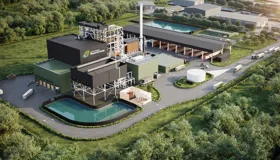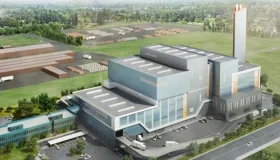
A plant that was the first of its kind in Australia is producing onsite power for major garden products supplier Richgro. The 2 MW anaerobic digestion plant can process more than 35,000 tonnes of commercial and industrial organic waste each year, converting it into energy for use at the Richgro operations in Jandakot WA.
2 MW
green power
$2.2m
CEFC finance
organic
waste
We recycle solid and liquid waste from nearby breweries, chicken farms, supermarkets and other food suppliers, right down to the aluminium cans from out-of-date or damaged beverages. Everything gets recycled which is a win-win situation for everyone – we use the energy created to fully power the plant and we use the digestate by-product, which is packed with living micro-organisms and nutrients, in our range of Richgro garden products.Geoff RichardsChairman, Richgro
Our investment
Perth-based Richgro, established in 1916, is one of the top five garden products suppliers in Australia. The CEFC invested in an anaerobic digestion plant for the company’s Jandakot operations to demonstrate the potential for producing energy from organic waste using a scalable technology that had a solid track record overseas, but not yet in Australia.
The $6.6 million anaerobic digestion plant was financed with a $2.2 million loan from the CEFC. The finance supported fourth-generation family garden products supplier to build on its commitment to producing environmentally sustainable products. The CEFC finance was repaid in April 2016.
our impact
An anaerobic digester works like a stomach, using bacteria to break down organic waste into biogas, which can be used as an energy resource, and digestate, which can be used in fertiliser. The technology has been widely used throughout Europe. The Richgro plant was the first of its kind built in Australia, developed using best-of-breed design and delivered to suit local conditions.
An anaerobic digester can help avoid business operation costs and generate new income streams by:
- Avoiding transportation costs and gate fees for waste disposal
- Avoiding grid electricity and heating costs
- Powering biogas-fuelled equipment and vehicles
- Feeding surplus energy to the grid.
The Richgro anaerobic digester processes solid and liquid commercial food waste from supermarkets, food processors, breweries and fruit and vegetable producers.
These waste products are unpackaged and pre-processed so that only the organic waste is processed in the anaerobic digestion plant. Recyclables such as plastic bottles and aluminium cans are on-sold at commercial rates.
The Richgro anaerobic digestion plant benefits include:
- Estimated abatement of more than 140,000 tCO2-e over a 20-year lifespan
- Enough power for Richgro operations at Jandakot
- Surplus energy sold into the power grid, potentially supplying enough clean energy for 1,800 Western Australian households.
- Certified organic waste output from the digester is either used in composting organic product onsite or provides organic content for arid farming soils.
- Waste heat is used in hothouses onsite where blueberries are grown out of season to meet export demand.




